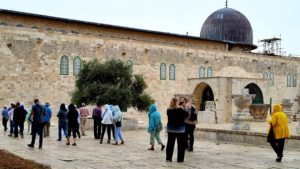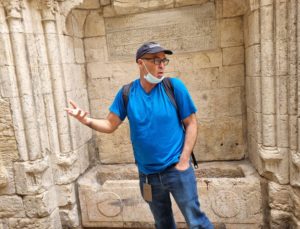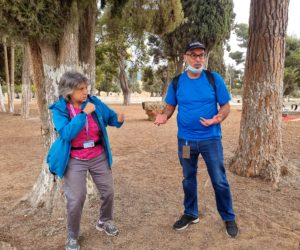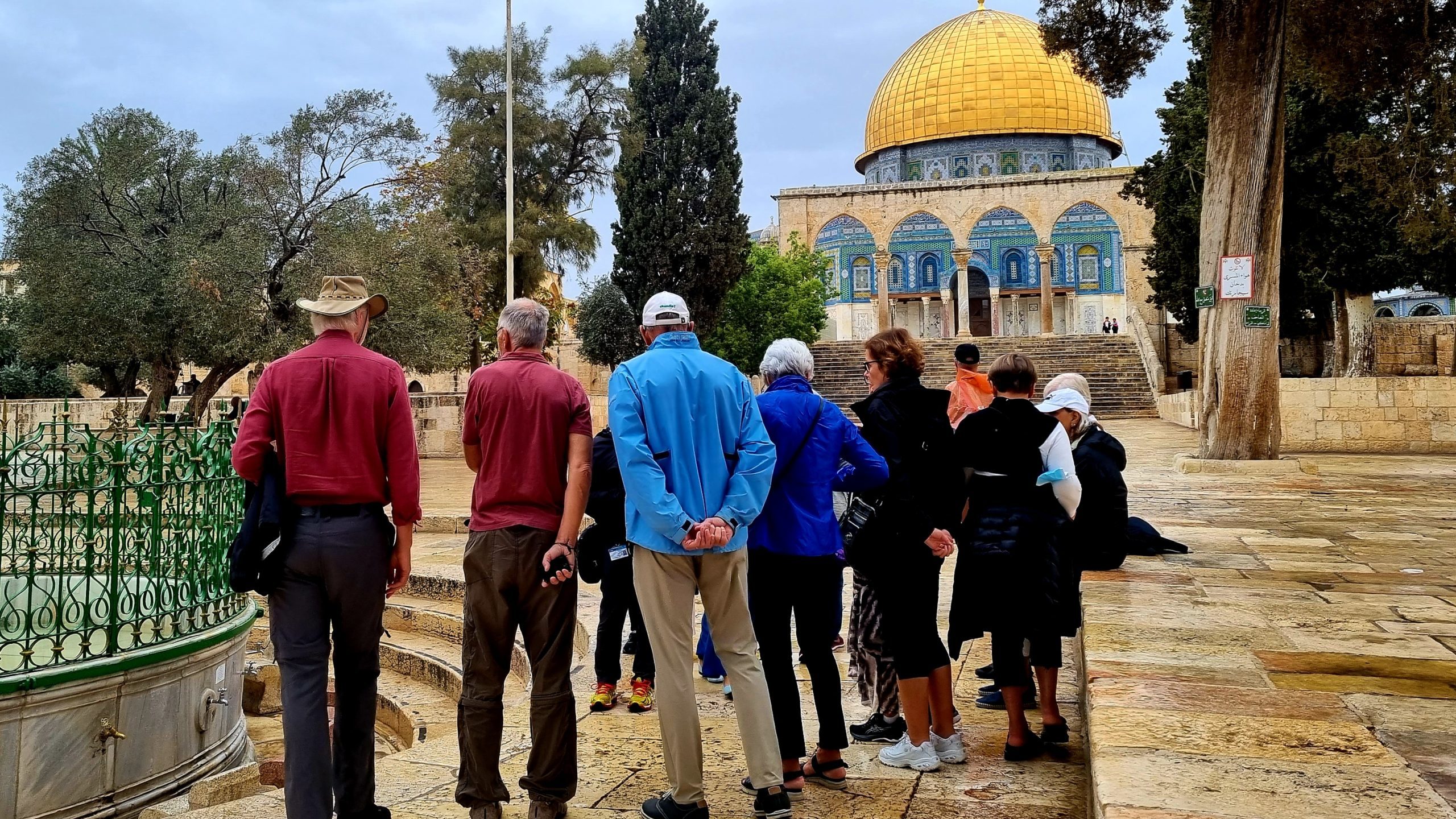Dual Narrative Tour Exposes Jerusalem’s Complex Political Realities
Palestinian and Jewish tour guides hope to encourage dialogue, as ailing Israeli tourism sector slowly comes back to life
On a rainy fall morning, small groups of tourists slowly filtered into the plaza of the Al-Aqsa Mosque compound.
There was a chill in the air and the cobblestones were wet as they walked up to get a closer look at the ornate tiles and glittering golden roof of the Dome of the Rock shrine, arguably Jerusalem’s most recognizable landmark.
The Al-Aqsa Mosque compound, also known as the Temple Mount, is Islam’s third holiest place and the holiest site in Judaism, and is only partly open to non-Muslims for visits during certain hours. Because of its dual heritages, the compound has long been a flashpoint in the Israel-Palestinian conflict.
There is perhaps no better place, then, to hold a tour exploring the complexities of Jerusalem’s history and fraught political reality.
Abraham Tours has undertaken this seemingly impossible task with relish.
Since Israel officially reopened to international visitors on November 1 for the first time since the start of the COVID-19 pandemic, Abraham Tours has revived its Jerusalem Dual Narrative Tour.

Israeli tourists approach Al Aqsa/Temple Mount in the Old City of Jerusalem on October 31, 2021. (Maya Margit/The Media Line)
After such a lengthy dry spell, Palestinian tour guide Husam Jubran and Jewish Israeli tour guide Sharon “Morgie” Morgenstern were excited about the prospect of tourists returning.
“Incoming tourism basically died a complete death,” Morgenstern, a professional tour guide and educator, told The Media Line during a visit to Al-Aqsa.
“It’s been a very difficult time,” she said.
Jubran, who has been a tour guide for 23 years, noted that the pandemic dealt tourism in the area an even heavier blow than did the Second Intifada, which began in September 2000.
“I used to receive at least one group every two months” during the Second Intifada, he told The Media Line. “With the pandemic there is nothing. Now it’s almost 19 months on and not a single group has come. We couldn’t do any kind of work connected to tourism,” Jubran said.
“We’re hoping things will start to change but we can’t count on it … it’s awful,” he said.
While Jubran has been able to weather the storm thanks to his work in civil society organizations including Hands of Peace, others in the Palestinian tourism sector have not been so lucky.
“People from the West Bank were not compensated at all,” Jubran explained, adding that, unlike Israelis, Palestinians have not received any financial assistance from the Palestinian Authority during the pandemic.
“Me and some other people collected some money and gave it to some guides because they had no food in their homes,” he said.

Palestinian tour guide Husam Jubran introduces tourists to the Old City of Jerusalem. (Maya Margit/The Media Line)
The dual narrative tour moved on from Al-Aqsa and its wide-open plaza to the famed narrow alleyways of Jerusalem’s Old City, beginning with the Cotton Market, where Muslim worshippers have walked for centuries on their way to or from the mosque. We eventually reached the Western Wall, where Jews the world over come to pray due to its proximity to the Temple Mount. The wall – built by Herod the Great some two millennia ago – makes up the western border of the Al-Aqsa compound.
Both Morgenstern and Jubran weaved in relevant historical tidbits and personal anecdotes about all of the sites as the group walked, explaining the nuances of what Palestinians and Jewish Israelis believe in relation to each place.
“I believe that is the way that you can make change,” Morgenstern said of the dual narrative tour. “You can hopefully get people to understand or at least hear a different perspective and maybe just open up a little to consider things that are not with the preconceived notions they came with. [They can] understand a little bit more about the complexities and the challenges that people that live here every day have to face.”
Unlike standard tours of the Holy Land, which often put the spotlight on only one religion, Abraham Tours gives visitors the chance to learn about many different perspectives and histories simultaneously.
“When they get the opportunity to hear two tour guides, they have the opportunity to get out of their comfort zone,” Jubran said.
Alongside the Jerusalem excursion, Abraham Group currently offers a range of dual-narrative experiences around the country. Among these are visits to the Gaza border, as well as a tour of the West Bank city of Hebron.

Tour guides Sharon “Morgie” Morgenstern and Husam Jubran offer competing narratives at the start of the Arbraham Tours’ Dual Narrative Tour. (Maya Margit/The Media Line)
For Yaron Burgin, co-founder and CEO of Abraham Group, one of the goals of the tours is to foster change in the way people view the Israel-Palestinian conflict.
“I think people are extremely curious about it,” Burgin told The Media Line. “A growing [number] of Israelis are curious about understanding more, especially beyond what they see on the news.”
Abraham Group operates four hostels in the Israeli cities of Jerusalem, Tel Aviv, Nazareth and Eilat. While the company had previously mainly targeted foreign visitors, the pandemic forced a shift in attention to domestic tourism.
“We were more than 200 staff members before COVID started,” Burgin said. “After the first lockdown we kept 100 people and we realized that, in the foreseeable future, there would be no work for all the rest so instead of keeping them on paid leave we had to let them go.”
“Most of them are not back with us,” he added. “We lost a lot of knowledge with those people.”
Despite this mass of layoffs, Burgin is optimistic that tourism will recover and return to pre-COVID-19 levels by mid-2022 if things continue on their current positive trajectory. The hostels have already begun to see an uptick in bookings, mainly from Europe and North America.
“We are working on launching tours in Sinai and then into Egypt,” Burgin said. “We believe in cooperation with the people in the area; leave politics aside because we all live here and we need to be able to live with each other.”


